Hidden Sources of Sugar:
Are hidden sources of sugar finding their way into your diet? We all like sweet foods and sweet flavors but are we being tricked into consuming more than we think we are? The average American consumes between 150-170 pounds of sugar a year according to the USDA. That is equivalent to 10 teaspoons of sugar each day!
Most people would say that don’t eat anywhere close to 10 teaspoons of sugar daily, because it isn’t like they are shoveling it down their face. They are being misled into believing many of the so called healthy items they are consuming are low in sugar. Unfortunately, many of these items contain hidden sources of sugar that make them as rich as a handful of candy.
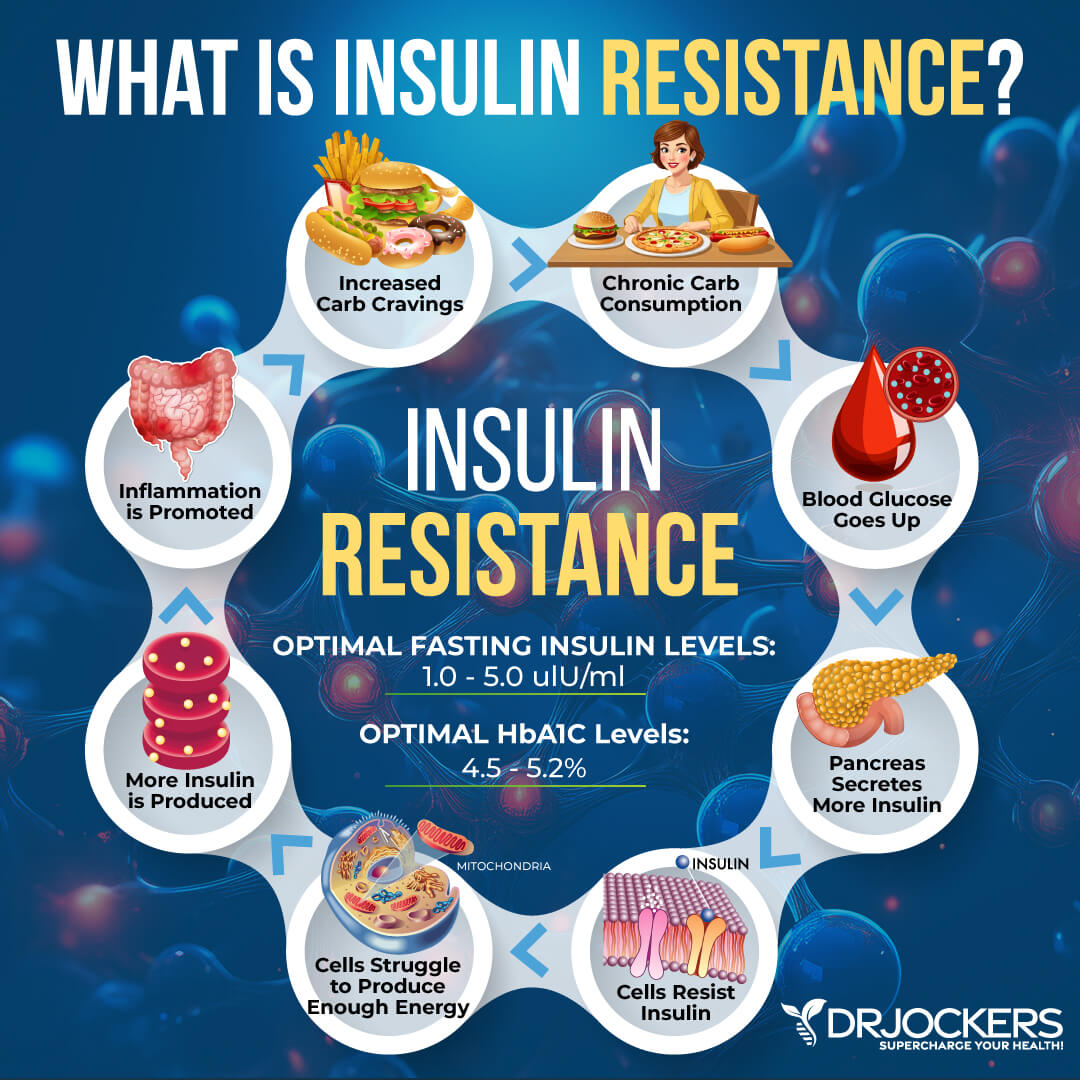
How Food Manufacturers Tricked My Mom
Growing up, my mom used to limit the amount of sugar my family would consume. We rarely had processed desserts, candy, and cupcakes. She did her best to keep sugar out of the house and bought foods we all assumed were part of a balanced, healthy diet.
Unfortunately, my mom, like most mothers throughout the world, was unaware of all the hidden sources of sugar found in many “healthy foods.” This hidden sugar can add up and cause significant inflammatory activity within the body.
Here is a list of foods most households are consuming and giving to their children thinking they are making healthy choices. They are what we refer to as hidden sources of sugar.
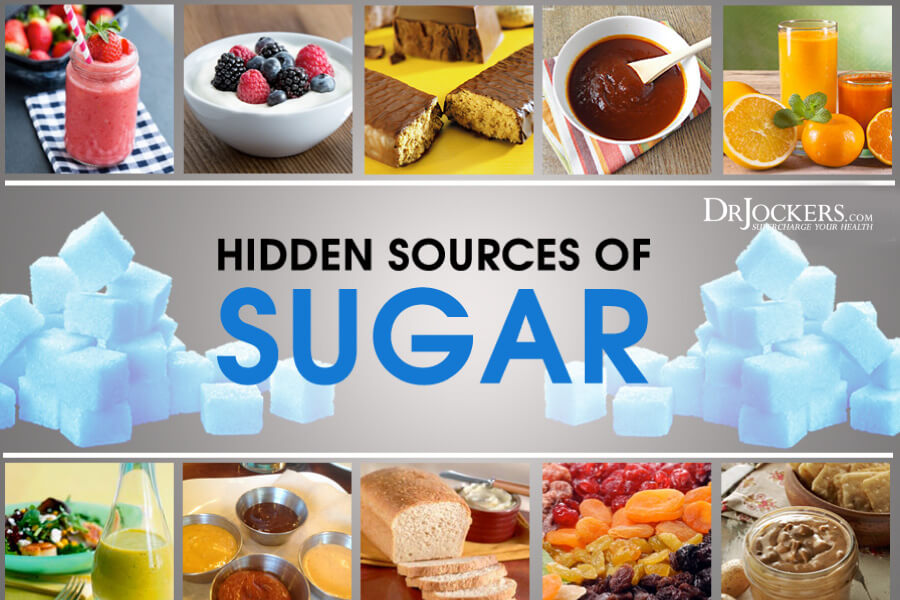
1. Smoothies:
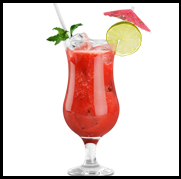 When I was 20 years old, I took a part-time job at Smoothie King because I loved exercise and nutrition and thought it would be cool to get a free smoothie every time I worked. Most people in society believe that stopping in to get a lunchtime smoothie is a very healthy activity.
When I was 20 years old, I took a part-time job at Smoothie King because I loved exercise and nutrition and thought it would be cool to get a free smoothie every time I worked. Most people in society believe that stopping in to get a lunchtime smoothie is a very healthy activity.
The truth is that the average smoothie contains 40-80 grams of sugar. The most popular drink on the menu, the Angel Food, contains 75 grams of sugar in the 20oz (the size small) cup. Much of this is from added sugar in addition to the bananas and strawberries.
My Recommendation: Avoid all the smoothie shops and make your own smoothie at home with frozen berries, coconut milk, coconut oil, high quality bone broth protein or collagen protein powder, and possibly even an avocado for extra fat. You will feel satisfied and should be able to go 4-6 hours after this without feeling hungry.
2. Yogurt:
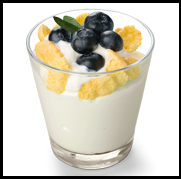 My family consumed yogurt daily. We loved all the different types but my favorite was the Breyer’s fruit on the bottom. Unfortunately, most of these contain up to 30 grams of sugar, often in the form of high fructose corn syrup.
My family consumed yogurt daily. We loved all the different types but my favorite was the Breyer’s fruit on the bottom. Unfortunately, most of these contain up to 30 grams of sugar, often in the form of high fructose corn syrup.
Today, most people assume that yogurt is healthy because it contains calcium, magnesium, protein, and probiotics. Unfortunately, the amount of sugar within these acts as an anti-nutrient, increasing the utilization rate of these key nutrients. Even Greek yogurt, which is touted as the healthiest form of yogurt contains 6-9 grams of sugar in a serving. This is much better than sugar sweetened yogurts but still more than most people realize.
My Recommendation: Use unsweetened coconut yogurt. You can find the So Delicious brand of Coconut milk yogurt in an unsweetened vanilla form and it tastes good and contains 1 gram of sugar per serving.
3. Protein Bars:
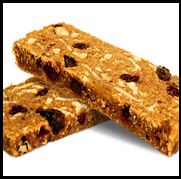 These are often marketed as healthy because they contain nuts and seeds that have beneficial qualities to them. Unfortunately, they are too often full of honey, high fructose corn syrup, and other sugar sources. I have seen them with anywhere from 10-30 grams of added sugar.
These are often marketed as healthy because they contain nuts and seeds that have beneficial qualities to them. Unfortunately, they are too often full of honey, high fructose corn syrup, and other sugar sources. I have seen them with anywhere from 10-30 grams of added sugar.
In the health food industry, there are greens bars and other superfood bars that are full of date sugar or honey which are simple sugars that cause inflammation and blood sugar imbalances. These also contain 10-30 grams of sugar in a simple bar.
My Recommendation: The best protein bars on the market are the Bulletproof Collagen Bars. You can also stick with organic beef or turkey jerky or do veggies and guacamole. Even better snack foods would be the coconut cup recipes on DrJockers.com.
4. Ketchup and BBQ Sauce:
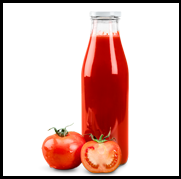 Ketchup was a regular item in my house growing up. We would use it on eggs, have it with bean burgers (when my family was vegetarian), and even on potatoes at times. Many people in our society use ketchup on a wide variety of things. In 2 tablespoons of ketchup, you can easily get 9-10 grams of sugar.
Ketchup was a regular item in my house growing up. We would use it on eggs, have it with bean burgers (when my family was vegetarian), and even on potatoes at times. Many people in our society use ketchup on a wide variety of things. In 2 tablespoons of ketchup, you can easily get 9-10 grams of sugar.
BBQ sauce has even more added sugar than ketchup and 2 tbsps. will typically give you around 12-15 grams of sugar.
My Recommendations: Use a ketchup source that is low in sugar and uses natural ingredients such as Primal Kitchen ketchup here and a sugar-free BBQ sauce like Simple Girl’s here.
5. Fruit Juice:
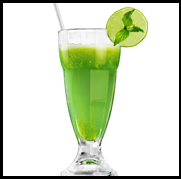 My family loved orange juice growing up. We would have this special treat on the weekends and would down a few gallons in those 2 days. 1 cup of Tropicana orange juice may contain 110% of your recommended amount of vitamin C, but it also contains 22 grams of sugar. That sugar content will deplete more vitamin C from your body than you are getting out of the juice!
My family loved orange juice growing up. We would have this special treat on the weekends and would down a few gallons in those 2 days. 1 cup of Tropicana orange juice may contain 110% of your recommended amount of vitamin C, but it also contains 22 grams of sugar. That sugar content will deplete more vitamin C from your body than you are getting out of the juice!
In the health realm, there are all kinds of green juices but most of them use fruit juice as a base. Most of these have 20-30 grams of sugar per cup. I don’t care how many superfoods they put in these drinks, that level of sugar acts as an inflammatory stimulant and depletes the body of vital nutritional stores.
My Recommendation: Make a natural lemonade with filtered water, freshly squeezed lemon or organic lemon juice, and stevia. This is a great tasting and refreshing drink. You can also add in ginger for even more health benefits.
6. Salad Dressings:
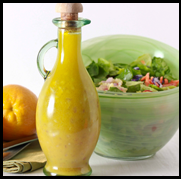 Most people assume that eating a salad is healthy and we certainly did in my family. We would get a big bowl full of romaine lettuce, baby spinach, tomato, cucumber, and onion. Then we would smother on the French, Russian, or Thousand Island Dressing or the Raspberry vinaigrette.
Most people assume that eating a salad is healthy and we certainly did in my family. We would get a big bowl full of romaine lettuce, baby spinach, tomato, cucumber, and onion. Then we would smother on the French, Russian, or Thousand Island Dressing or the Raspberry vinaigrette.
Unfortunately, these all contain 10-12 grams of sugars in 2 tbsps. They often have added sugars in the form of “corn syrup solids.” Even typical commercial balsamic vinaigrettes contain 5 grams of sugar in the form of cornstarch in a 2 tbsp. serving.
My Recommendation: Skip the fancy dressings and use olive oil and either fresh squeezed lemon or apple cider vinegar with dried herbs as your dressing. It tastes great and will help improve your metabolism and digestion.
7. Special Sauces:
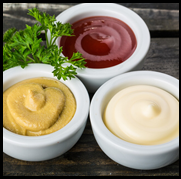 Most restaurants have special sauce recipes they put on the various meat dishes to dress them up and give them unique and exotic flavors. Unfortunately, most of these special sauces contain a high amount of added sugars in the form of corn starches, corn based maltodextrin, and high fructose corn syrup.
Most restaurants have special sauce recipes they put on the various meat dishes to dress them up and give them unique and exotic flavors. Unfortunately, most of these special sauces contain a high amount of added sugars in the form of corn starches, corn based maltodextrin, and high fructose corn syrup.
Any sort of dish that uses the term “glazed” is going to contain added sugars. It is much better to stick with meat that has been grilled, baked, or broiled.
My Recommendation: Get your meat grilled, baked, or broiled, and tell the serving staff to hold the extra sauces and glazes. Instead, add fresh or dried herbs, vinegar or lemon juice, and olive oil or butter.
8. Whole Wheat Bread:
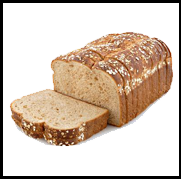 Growing up my parents would never get white bread. We always got some sort of whole wheat bread. We thought this was much healthier, but we know that 2 slices of whole wheat bread can raise your blood sugar more than 2 tbsps. of table sugar.
Growing up my parents would never get white bread. We always got some sort of whole wheat bread. We thought this was much healthier, but we know that 2 slices of whole wheat bread can raise your blood sugar more than 2 tbsps. of table sugar.
Many people also believe that sprouted grain breads such as Ezekiel bread are good, but unfortunately, these two are loaded with carbs that drive up your blood sugar.
My Recommendation: Avoid the bread and stick with a diet rich in good fat sources, lots of veggies, occasional fruit, and healthy meats. For a bread alternative, try making coconut flour bread. You can also use coconut flour wraps here for a take to work lunch.
9. Dried Fruit:
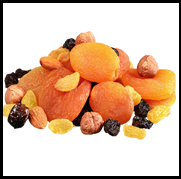 Most people think that having a handful of raisins or craisins (dried cranberries) is a healthy snack. Many granola’s are full of dried fruit. These are loaded with added and concentrated sugars. One quarter cup of craisins contains 29 grams, nearly 6 tsps., of sugar!
Most people think that having a handful of raisins or craisins (dried cranberries) is a healthy snack. Many granola’s are full of dried fruit. These are loaded with added and concentrated sugars. One quarter cup of craisins contains 29 grams, nearly 6 tsps., of sugar!
My Recommendations: Avoid dried fruit sources and consume either whole fruit sources which have more antioxidants, enzymes, and fiber.
10. Nut Butters:
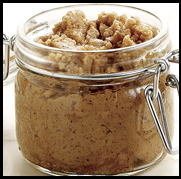 People like nut butters that are sweet. Your typical Jif has 3-4 grams of added sugar in it and when people want a healthier alternative to the trans-fat rich commercial peanut butters, they still want the sweet taste.
People like nut butters that are sweet. Your typical Jif has 3-4 grams of added sugar in it and when people want a healthier alternative to the trans-fat rich commercial peanut butters, they still want the sweet taste.
Even great brands such as MaraNatha use organic evaporated cane sugar as one of the top ingredients. Be sure to check your nut butter to avoid these added sugars.
My Recommendations: Stick with pure organic nut butters and raw nuts that are free of added sugars and toxic oils.
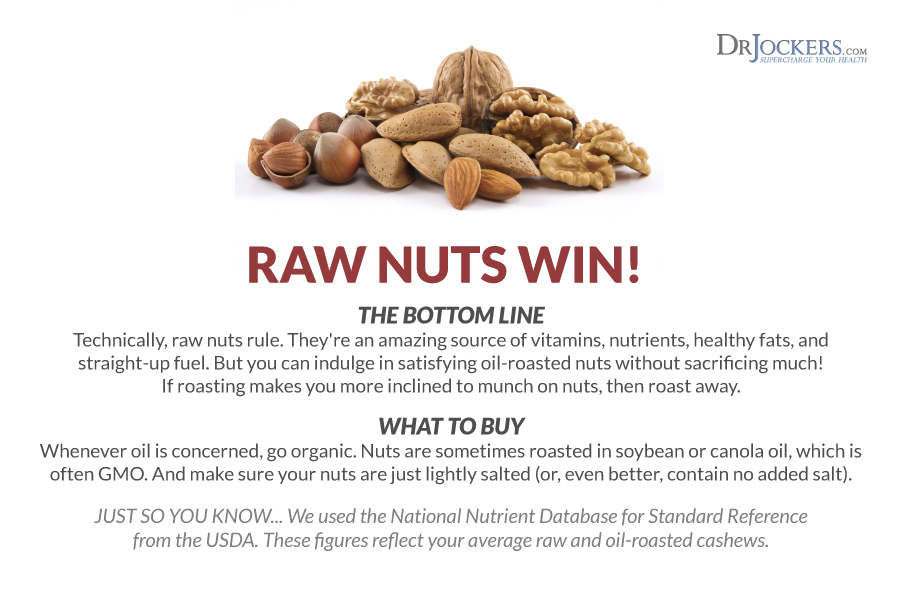
Conclusion:
As you can see, many of the foods we once thought were awesome, are actually full of added sugars. Consuming too much sugar inflames our bodies and leads to major health issues such as unnecessary weight gain, insulin resistance, joint pain, autoimmune conditions, leaky gut syndrome, and neurological degeneration.
It is important to choose foods that are high in protein, healthy fats, and micronutrients. Avoid ultra processed foods that have a high glycemic impact to reduce cravings, and inflammation and to turn on fat burning mechanisms.
If you want to work with a functional health coach, I recommend this article with tips on how to find a great coach. On our website, we offer long-distance functional health coaching programs. For further support with your health goals, just reach out—our fantastic coaches are here to support your journey.

Inflammation Crushing Ebundle
The Inflammation Crushing Ebundle is designed to help you improve your brain, liver, immune system and discover the healing strategies, foods and recipes to burn fat, reduce inflammation and thrive in life!
As a doctor of natural medicine, I have spent the past 20 years studying the best healing strategies and worked with hundreds of coaching clients, helping them overcome chronic health conditions and optimize their overall health.
In our Inflammation Crushing Ebundle, I have put together my very best strategies to reduce inflammation and optimize your healing potential. Take a look at what you will get inside these valuable guides below!
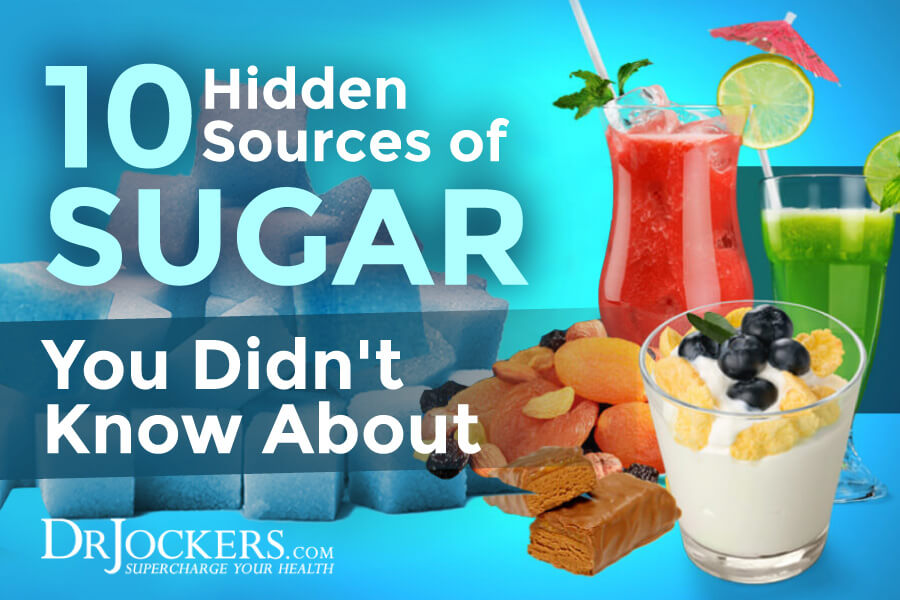



At what point is the fear of what to eat more damaging than what to eat?
What does the lady mean never eat raw nuts? Seriously? I know about peanuts and you should buy organic – but really?
Why is it that those concerned with nutrition only ever address weight loss and never weight gain especially when clean eating can lead to weight loss that does not always seem healthy?
Seriously if a person eats a slice or two of Ezkeil bread are they really jeopardizing their health?
Larayne,
Sorry to intimidate you with this. The goal is really to do the best you can, but always to be aware when you are consuming more sugar. The goal is the same if you want to gain weight, because a high carb diet and blood sugar imbalances will cause tissue breakdown and muscle and joint catabolism. Blood sugar stability is extremely important for good health. Here is another helpful article for when you do consume more carbs (like Ezekial bread). https://drjockers.com/7-simple-strategies-to-buffer-blood-sugar-levels/
You mentioned, under #8 Whole Wheat Bread, making coconut flour bread, but I didn’t see a coconut bread recipe on that link. Do you have a bread recipe using coconut flour? Thank you!
Yes Joan – here it is: https://drjockers.com/coconut-flour-bread/